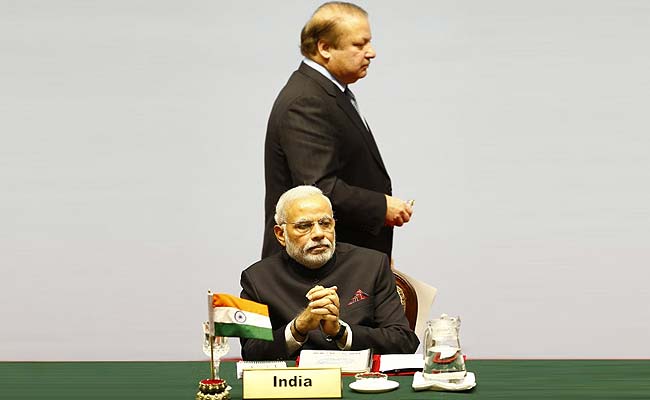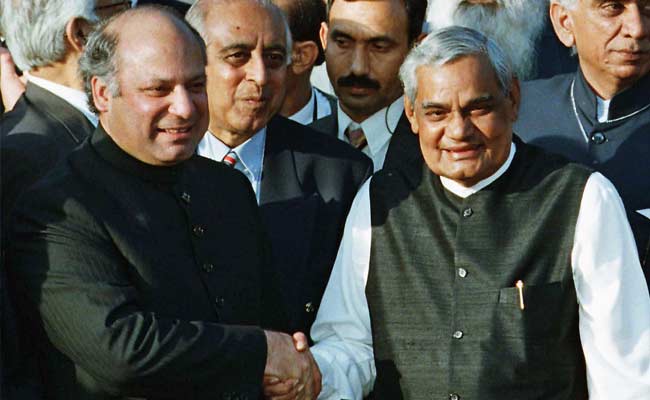Of course, Pakistan takes advantage of any little trouble we might experience in Kashmir. But what else can one expect when they persist in pursuing their claim to the entire Riyasat? Sternly warning them to keep off, as our Minister of External Affairs has been obliged to do, might appease a section of domestic opinion, but serves only to distract our attention from squarely facing up to the distress of dissatisfied and dissenting Kashmiris who run to hundreds of thousands - or even more. They believe New Delhi has given them a raw deal. They have to be brought around by undoing what can be undone and doing what can be done so that Kashmir being an inseparable part of India is not just what we proclaim but also what they endorse.
Some years ago, a prominent anti-establishment Pakistani journalist visited India to deliver a talk on all that had gone wrong with his country. He was convinced that India was to blame for their woes because if only we had allowed J&K to become part of Pakistan, military dictatorships would not have overtaken their polity. At question time, I innocently asked why if Pakistan was such a disaster for 150 million Pakistani Muslims (the estimate at that time) - why would 6 million Kashmiri Muslims wish to suffer the same fate? He did not really answer but, for his pains, was thrown into prison when he returned to Lahore. That, we may safely assume, is not the preferred option of almost any Kashmiri.
Which is why there was little outrage in Srinagar or Islamabad when the first point of agreement to emerge out of the back-channel talks between Ambassador Sati Lambah and special envoy Tariq Aziz (2004-07) was that both sides agreed there could be no question of an independent, sovereign state of J&K. It was also agreed that there was no question of any solution to J&K requiring any exchange of territory or people but by facilitating the economic and cultural re-integration of that part of Kashmir administered since 1947 by Pakistan and that part administered by India. The next two points dealt with how this could be achieved, but while agreement in principle was reached, detailed work was still going on when the back-channel talks were called off because Musharraf's throne started tottering and fell a few months later.
That is the point from where the Modi government should resume negotiations - but won't. It is a matter of record and statistical fact that when the India-Pakistan dialogue is on, not only does firing across the Cease-Fire Line (CFL) sharply taper off, but infiltration significantly declines, and incitement and quasi-official support to incitement to terrorism and militancy drops down. This, in turn, facilitates the return to normalcy in the Valley.

PM Narendra Modi and Pakistan Prime Minister Nawaz Sharif at the 18th SAARC Summit (File photo)
While talking to Pakistan, the Manmohan Singh government initiated a second parallel dialogue with all these dissatisfied and dissident elements. A series of subject-wise round tables were held to ascertain every shade of Kashmiri opinion. An all-party delegation was sent to talk to everyone who was willing to talk to them. Thereafter, three interlocutors - Dileep Padgaonkar, Radha Kumar, MM Ansari - were appointed to undertake talks with anyone and everyone who wished to interact with them. Although a few boycotted the proceedings, by and large these initiatives were more inclusive of Kashmiris than any initiative earlier taken. The reports and recommendations of these initiatives have, alas, been allowed to gather dust - and we are seeing the consequences thereof.
But that was not immediately apparent as action on the ground was palpably softening the LoC, leading to the genuine prospect of the LoC being rendered "irrelevant" as far as family and human contact was concerned, the restoration of cultural links after half a century of little or no mutual symbiosis, and cross-LoC traffic and trade became a reality. Giving renewed momentum to such practical matters would set the tone for talks.
Such talks would have to take as the starting point PV Narasimha Rao's promise that as far as autonomy was concerned, "the sky is the limit". That one phrase did more to temper militancy and bring Kashmir back to the path of democracy and emotional integration with the rest of India than any single other word or action. It was followed by the 1997 decision to undertake a "composite dialogue" with Pakistan over a range of subjects, including Kashmir. Within a year, tourists started trickling back into the Valley, businesses re-opened, schools and colleges started functioning, and not even the 1999 Kargil war disturbed the peace in the Valley. It was in this context that Vajpayee famously offered insaniyat, jamhooriyat and Kashmiriyat as the framework for the way forward. Niggling issues of the law or the constitution were to give way to a larger vision that aroused hope in the hearts of disillusioned Kashmiris.

Pakistan Prime Minister Nawaz Sharif and then PM Atal Bihari Vajpayee at the Wagah border near Lahore in 1999 (Associated Press)
Were such an offer to be made, we would see the negotiating round table fill with many of the political forces behind the militancy and stone-throwing. With all of them should be negotiated those Indian laws and jurisdictions, extending beyond the realm of the terms of accession, as they find unacceptable. In other words, while the sovereignty of India over J&K would be reiterated, the outcome of these negotiations would be what Chidambaram has elegantly described as "asymmetric devolution."
This is not a concept foreign to our Constitution. Even a brief look at Article 371 (which follows Article 370 that deals with J&K) would show that "asymmetric devolution" is part of the very structure of our Constitution. From Article 371 through 317A - 371J, we have "special provisions" that apply not only to the North Eastern states (Nagaland, Assam, Manipur, Sikkim, Mizoram, Arunachal Pradesh) but also Goa and much larger states such as Andhra Pradesh and Karnataka, and even Maharashtra and Modi's own Gujarat.
The difference between J&K and these states is that whereas these "special provisions" are permanent for all 11 states covered by Article 371, the "special provisions" for J&K are "temporary". Moving the article that was later numbered 370, Law Minister Gopalaswamy Ayyangar explained that the article was "temporary" pending a final settlement of J&K and the recovery of that part of the Maharajah's Riyasat that had been illegally captured by Pakistan. One possible way forward would be to make 370 too "permanent" after re-negotiating the article to bring it in line with the present aspirations of the people of J&K. If "asymmetric devolution" can be the constitutional norm for as many as six small states and five large states, what would be the insuperable legal difficulty in making special provisions for J&K "permanent" for J&K so to remain within the Union but on terms that better reflect the public will than the extant arrangements?
Moreover, the re-negotiated article could provide that when the Pakistan-occupied regions of the Riyasat are restored to India, the new article 370 would apply to those regions as well.
J&K is special for a variety of political, administrative, geographic, economic and cultural reasons. Conferring special status on the state on a permanent basis would be entirely consistent with the overall structure of the Constitution. It would also be a most dramatic celebration of the wonderful diversity of India that is the foundation of our national unity.
There is only one hitch: the BJP, especially a BJP headed by Narendra Modi. It would be entirely out of character for them to accept that J&K is so different from other states as to warrant special status. Legally, they are part of the ruling dispensation in the state, but their legitimacy is in question because they did not win a single seat in either Kashmir or Ladakh. Their domination over Mehbooba's PDP, without any Kashmiri representation, is the heart of the problem.
Yet, Mehbooba is in many ways the best bet because she has earned for herself a well-deserved reputation for being sympathetic and humane towards the dissatisfied and dissident elements of the polity. For her to rise above her current partner is a necessary precondition for alternative pathways to be explored. That can happen only if the government of Jammu & Kashmir is reconstituted to exclude the BJP; or, alternatively, by holding fresh elections. Short of that, there is no prospect for the restoration of normalcy in the state of Jammu & Kashmir.
(Mani Shankar Aiyar is former Congress MP, Lok Sabha and Rajya Sabha.)
Disclaimer: The opinions expressed within this article are the personal opinions of the author. The facts and opinions appearing in the article do not reflect the views of NDTV and NDTV does not assume any responsibility or liability for the same.


